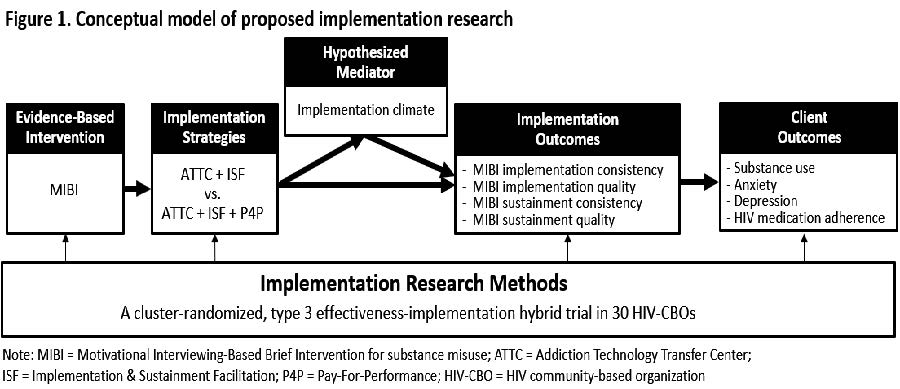The project will test the effectiveness of ATTC + ISF + P4P on implementation and client outcomes and the extent to which implementation climate mediates the implementation condition to outcome relationship.
This is an accordion element with a series of buttons that open and close related content panels.
Background
Despite its relevance to public health, the integration of substance use services into HIV service settings has been limited to date. Substance misuse interventions such as motivational interviewing (MI) have been effective in clinical trials but can be challenging to implement in practice settings, including HIV community-based organizations (HIV-CBOs) that are essential to HIV care. Since 2014, the proposed research team has been conducting some of the most innovative, large-scale implementation research on this topic as part of the Substance Abuse Treatment to HIV Care (SAT2HIV) project. Funded by the National Institute on Drug Abuse (NIDA), this 39-site, dual-randomized, type 2 effectiveness-implementation hybrid trial simultaneously tested (1) the effectiveness of an MI-based brief intervention (MIBI) for substance misuse as an adjunct to usual care and (2) the effectiveness of team-focused Implementation & Sustainment Facilitation (ISF) as an adjunct to the Addiction Technology Transfer Center’s (ATTC’s) staff-focused strategy (i.e., online training + in-person training + feedback + consultation). Results from the SAT2HIV project showed that the ATTC+ISF strategy significantly improved implementation effectiveness (i.e., consistency and quality of implementation) and intervention effectiveness (i.e., effectiveness of MIBI to reduce substance misuse). However, even in the ATTC+ISF condition, room for improvement in implementation remained. Additionally, neither study condition resulted in sufficient sustainment. Thus, there is a need for implementation research to identify strategies that can further improve outcomes beyond the ATTC+ISF strategy. According to implementation effectiveness theory, implementation climate (i.e., the extent to which implementation is expected, supported, and rewarded) is a key mechanism of change through which an implementation strategy impacts implementation effectiveness. Although the ISF strategy already seeks to maximize implementation effectiveness by improving implementation climate, the proposed research team’s prior implementation research suggests that pay-for-performance (P4P; i.e., monetary bonuses for achieving predefined targets) is a strategy that may significantly enhance the effectiveness of the ATTC+ISF strategy. Thus, our research team proposes the SAT2HIV-II project, a 30-site, cluster-randomized, type 3 effectiveness-implementation hybrid trial to test the effectiveness of P4P (i.e., compare the ATTC+ISF strategy and the ATTC+ISF+P4P strategy) to significantly improve implementation outcomes (primary aim) and client outcomes (secondary aim). The 2019 Ending the HIV Epidemic initiative seeks to end the HIV epidemic within 10 years. This goal is achievable but may not be possible without improving the extent to which substance use services are integrated into HIV service settings. Although the SAT2HIV-II project focuses on testing strategies to improve the integration of an MIBI for substance misuse, the knowledge gained could help HIV-CBOs improve the integration of other innovations. As such, the SAT2HIV-II project has potential to have a large and sustained impact on improving public health.
Aims
Primary aim: To test the effectiveness of ATTC + ISF + P4P on implementation outcomes.
Primary hypothesis: Relative to ATTC + ISF, ATTC + ISF + P4P will achieve significant improvements in staff-level measures of MIBI implementation consistency, MIBI implementation quality, MIBI sustainment consistency, and MIBI sustainment quality.
Secondary aim: To test the effectiveness ATTC + ISF + P4P on client outcomes.
Secondary hypothesis: Relative to ATTC + ISF, ATTC + ISF + P4P will achieve significant reductions in client-level measures of substance use, anxiety symptoms, and depression symptoms, as well as significant improvements in HIV medication adherence.
Exploratory aim: To test the extent to which implementation climate mediates the implementation condition to outcome relationship.
Exploratory hypothesis: Implementation climate will partially mediate the relationship between implementation condition and each outcome in the primary and secondary aims.
Conceptual Model
Adapted from Proctor and colleagues’ (2009) Conceptual Model of Implementation Research [1], Figure 1 provides an overview of the proposed implementation research, which represents a strong collaboration between an experienced team of implementation researchers, one of HRSA’s largest AETCs, and 30 HIV-CBOs. Regarding our research methods, we propose a cluster randomized, type 3 effectiveness-implementation hybrid trial focused on testing strategies to improve the implementation and sustainment of an MIBI for addressing substance misuse in HIV-CBOs. Consistent with the type 3 hybrid trial design, the primary aim is to compare the two conditions (ATTC + ISF condition and ATTC + ISF + P4P condition) with regard to impact on implementation outcomes (MIBI implementation consistency, MIBI implementation quality, MIBI sustainment consistency, MIBI sustainment quality) and the secondary aim is to compare the two conditions in terms of impact on client outcomes (substance use, anxiety, depression, HIV medication adherence). Expanding on Proctor et al.’s model [1], our exploratory aim will examine the extent to which implementation climate, a theorized mechanism of change, explains the effect of implementation condition on these outcomes.

